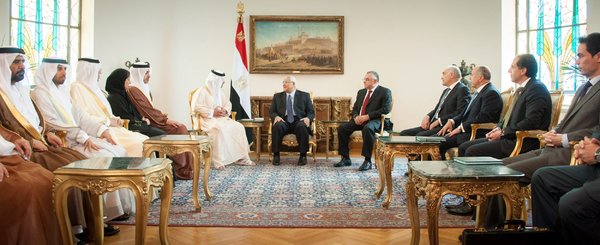UAE plots behind Egyptian coup d’etat
Cairo: August 18, 2013
 The Abu Dhabi regime, United Arab Emirates, is one of the major sponsors of ‘Egyptian coup d’état’. Western diplomats here said they believed the Emiratis were privately urging the Egyptian security forces to crack down the supporters of ousted President Mohamed Mursi, that killed hundreds of people, when authorities forcibly broke up protest camps.
The Abu Dhabi regime, United Arab Emirates, is one of the major sponsors of ‘Egyptian coup d’état’. Western diplomats here said they believed the Emiratis were privately urging the Egyptian security forces to crack down the supporters of ousted President Mohamed Mursi, that killed hundreds of people, when authorities forcibly broke up protest camps.
“Western governments took a wait-and-see approach even after the military committed its first mass killing, shooting more than 60 supporters of Mr. Morsi at a sit-in on July 8. Western diplomats did not engage in earnest until July 24, when General Sisi, in dark sunglasses and military regalia, delivered a fiery speech asking the public to turn out for demonstrations giving him a “mandate” to take on the Islamists. Security forces killed 80 more Morsi supporters in their second mass shooting on the day of the demonstration.
The next morning, Morsi aides and Brotherhood leaders say, their phones began ringing with American and European diplomats fearing an imminent blood bath.
The administration enlisted people on opposite sides of the contest unfolding in Egypt. Diplomats from Qatar, a regional patron of the Muslim Brotherhood, agreed to influence the Islamists. The United Arab Emirates, determined opponents of the Islamists, were brought in to help reach out to the new authorities.
But while the Qataris and Emiratis talked about “reconciliation” in front of the Americans, Western diplomats here said they believed the Emiratis were privately urging the Egyptian security forces to crack down.
Abdullah bin Zayed al-Nahyan, the Emirati foreign minister, went to Washington last month and urged the Americans not to cut off aid. The emirates, along with Saudi Arabia, had swiftly supported the military takeover with a pledge of billions of dollars, undermining Western threats to cut off critical loans or aid.
The Israelis, whose military had close ties to General Sisi from his former post as head of military intelligence, were supporting the takeover as well. Western diplomats say that General Sisi and his circle appeared to be in heavy communication with Israeli colleagues, and the diplomats believed the Israelis were also undercutting the Western message by reassuring the Egyptians not to worry about American threats to cut off aid.
Israeli officials deny having reassured Egypt about the aid, but acknowledge having lobbied Washington to protect it.
When Senator Rand Paul, Republican of Kentucky, proposed an amendment halting military aid to Egypt, the influential American Israel Public Affairs Committee sent a letter to senators on July 31 opposing it, saying it “could increase instability in Egypt and undermine important U.S. interests and negatively impact our Israeli ally.” Statements from influential lawmakers echoed the letter, and the Senate defeated the measure, 86 to 13, later that day”.
Photograph: The interim Egyptian president, Adli Mansour, center, met with officials of the United Arab Emirates in Cairo. The richest monarchies have pledged $12 billion in cash and loans to Egypt, a decision aimed not only at shoring up a shaky transitional government, but also at undermining their Islamist rivals and strengthening their allies across a newly turbulent Middle East.
Read More at: ‘How American Hopes for a Deal in Egypt Were Undercut‘
More Resources:
Evil prospers when good men do nothing
‘Tolerating evil leads only to more evil. And when good people stand by and do nothing while wickedness reigns, their communities will be consumed’. Evil prospers when good men do nothing
Roundup of events in the Middle East: The Guardian
Saudi Arabia, the UAE and Kuwait, relieved to see the back of the Brotherhood, seen as a threat to their own monarchies, immediately promised $12 billion in aid to the new authorities, to help overcome imminent fuel and wheat shortages.
Western allies warned Egypt’s military leaders right up to the last minute against using force to crush protest sit-ins by supporters of the ousted Islamist president Mohamed Mursi, arguing they could ill afford the political and economic damage.
Hundreds of people died and thousands were wounded on Wednesday when police cleared out two protest camps in Cairo set up to denounce the military’s overthrow of Egypt’s first freely elected president on July 3 and to demand his reinstatement. Roundup of events the Guardian

